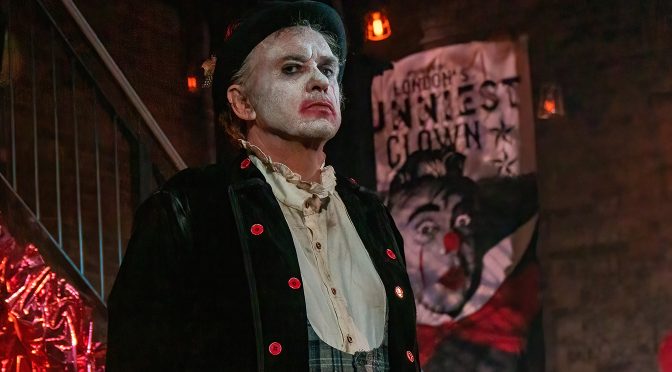This revival of Justin Butcher’s 2001 play affords the opportunity to see an intriguing and acclaimed text. The “long and weary” life of its centenarian character, a famous clown, of course, recalled on the night of his death at the end of the 20th century, is a compelling yarn that balances elements of the fantastic with weighty concerns.
Scaramouche’s life is colourful, to say the least. But it is also one filled with trauma and pain. His birth in a brothel in Trinidad, his life as a snake-charming slave and eventual arrival as an immigrant in Britain show us a world where people “mingle and co-mingle”. The globe-trotting Scaramouche covers a lot of ground.
As a consideration of Privilege, with a capital P, the character’s complexion (without make-up) proves a fascinating motif. Jones’ skin helps him in bizarre and unexpected ways. His whiteness saves his life. But note, it is also a mark of pain: frosted tears, white sand and lime from burials all contribute to the “seven white masks” that are the play’s subtitle. Start your debate.
The text is full of vivid images and incredible characters. Scaramouche’s mother, the “charming villains” he meets, and the “beggars and invalids from the four corners of the globe” create the world picture Jones aims for. And such a vast canvas makes the play a tricky one to perform.
To describe this particularly ambitious monologue as competent is not faint praise. Director Ian Talbot’s presentation is clear and concise. But the use of sound effects is overplayed – they add little to the descriptions of events. And both Talbot and his performer, Shane Richie, try to inject energy unnecessarily. Along with lots of accents of, erm, variable success, Richie’s delivery becomes grating, his sense of rhythm too monotonous.
Richie does rise to the play’s central scene. Scaramouche’s time in a concentration camp is a strong moment for all. Nailing the emotion and ambiguity of the play’s hardest, and best, scene becomes an unforgettable moment. It’s as a grave-digger that Scaramouche, incredibly, discovers his ability to make children laugh. His big picture approach ensures these ‘tears of a clown’ are peculiarly original, poignant and thought-provoking.
Until 11 April 2021
Photo by Bonnie Britain

